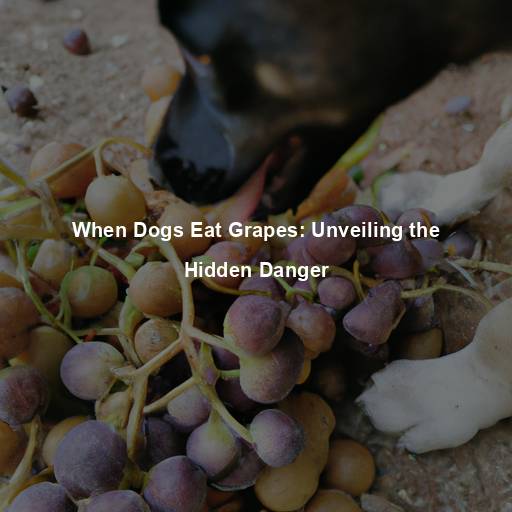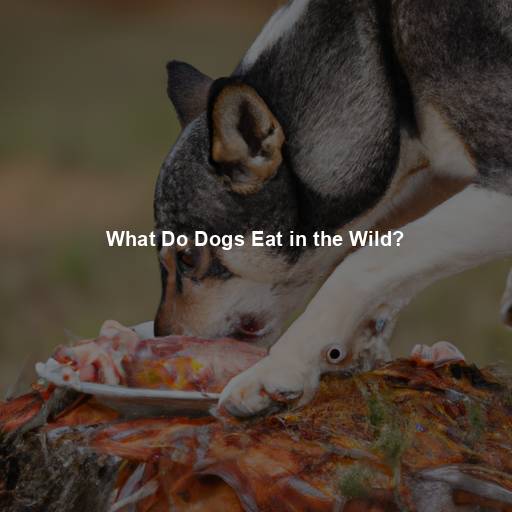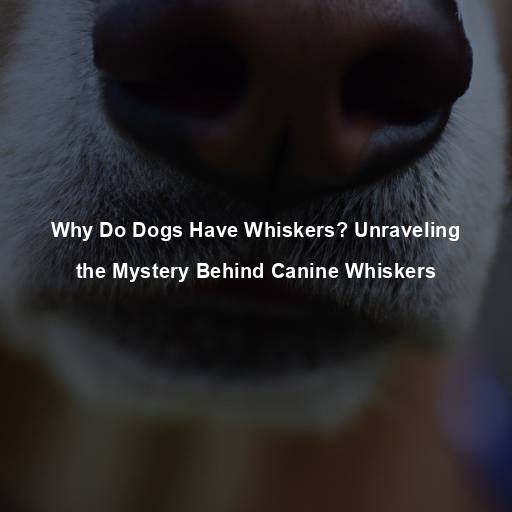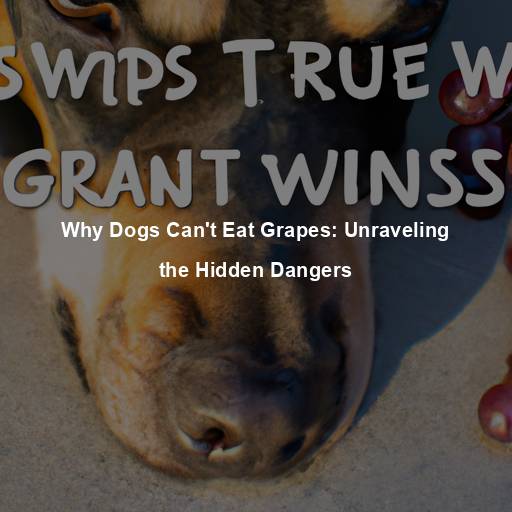When Dogs Eat Grapes: Unveiling the Hidden Danger
Last Updated on November 9, 2023 by Evan
Contents
- 1 Understanding the Grape Toxicity in Dogs
- 1.1 The Toxic Culprit: Unknown Yet Dangerous
- 1.2 Symptoms: Detecting the Danger
- 1.3 When to Seek Veterinary Care
- 1.4 Treatment: Addressing the Emergency
- 1.5 Prevention: Safeguarding Your Furry Friend
- 1.6 Spread the Word: Raising Awareness
- 1.7 Potential Complications and Long-Term Effects
- 1.8 Other Foods Harmful to Dogs
- 1.9 The Importance of Prompt Veterinary Care
- 1.10 A Word of Caution: Individual Sensitivity
- 1.11 The Bond Between Dogs and Humans
- 1.12 Uncovering the Origins of Grape Toxicity in Dogs
- 1.13 Can Dogs Safely Consume Grapes in Small Amounts?
- 1.14 Understanding the Variability of Sensitivity
- 1.15 The Role of Breed and Size
- 1.16 The Danger of Delayed Symptoms
- 1.17 The Importance of Prompt Veterinary Intervention
- 1.18 Preventing Grape Toxicity: A Shared Responsibility
- 1.19 Raising Awareness: A Collective Effort
- 2 FAQs for when dogs eat grapes
- 2.1 Can dogs eat grapes?
- 2.2 What happens if my dog eats grapes?
- 2.3 How many grapes are considered toxic to dogs?
- 2.4 Are all dogs equally affected by grapes?
- 2.5 What should I do if my dog ate grapes accidentally?
- 2.6 Are there any safe alternatives to grapes for dogs?
- 2.7 Can I give my dog grape products like grape juice or grape-flavored treats?
- 2.8 What if my dog accidentally eats raisins?
Understanding the Grape Toxicity in Dogs
Grapes are a popular and nutritious fruit enjoyed by humans around the world. However, what many pet owners may not realize is that these seemingly harmless fruits can pose a significant threat to their beloved canine companions. Yes, you heard it right! Dogs and grapes are not a good mix.
The Toxic Culprit: Unknown Yet Dangerous
Throughout years of diligent research, the enigma surrounding the specific culprit lurking within grapes that endangers our canine companions remains shrouded in mystifying uncertainty. This perplexing conundrum continues to bewilder the minds of esteemed scientists and veterinarians, leaving them grappling for answers. However, what remains undeniably clear is the staggering magnitude of the devastation even the tiniest portion of grapes or raisins can inflict upon our beloved four-legged friends, causing irreparable harm such as life-threatening kidney failure.
Symptoms: Detecting the Danger
Identifying the harmful effects of grapes on our furry companions can prove to be quite perplexing, as the ominous symptoms often choose to play hide-and-seek, evading detection until an undetermined period of time has elapsed. The bewilderment surrounding this matter demands utmost attention from pet owners, prompting them to remain steadfast and well-informed about the potential peril lurking in their homes. Should the trepidation of grape or raisin consumption plague your thoughts, brace yourself for a peculiar game of observation as you vigilantly scan for the telltale signs that may eventually grace your four-legged friend.
Feeling nauseous and experiencing the sudden, uncontrollable urge to vomit can be extremely discomforting. The body’s reaction of expelling stomach contents through the mouth can leave one feeling bewildered and overwhelmed. Such episodes of vomiting can be caused by a variety of factors, such as food poisoning, viral infections, or even intense motion sickness. These unexpected bouts of regurgitation can definitely put a damper on one’s day and leave them feeling puzzled and perplexed.
Are you tired of dealing with the dreaded “D” word? It can be a real pain in the… well, you know. But fear not, because we’ve got some unconventional solutions that just might help you kiss those stomach woes goodbye.
Have you ever found yourself staring at a plate of food, feeling a sudden disinterest in eating? It may seem perplexing, this sudden loss of appetite, as it leaves us questioning the very essence of our existence. In a burst of confusion, we search for answers, wondering what could have triggered this unexpected change in our body’s desires. Yet, amidst the uncertainty, one thing remains certain: the human experience is full of twists and turns, and our appetites, like our emotions, can be just as unpredictable.
4. Lethargy or weakness
5. Abdominal pain or discomfort
When it comes to our bodies, we rely on them to function properly and maintain our overall health. One key aspect is the process of urine production, which plays a vital role in eliminating waste from our system. However, at times, we may experience a decline in urine production, leaving us perplexed and concerned about what could be causing this unexpected change. Understanding the various factors that can contribute to decreased urine production is crucial for ensuring our wellbeing.
7. Increased thirst
When to Seek Veterinary Care
If you notice any of the aforementioned symptoms or suspect your dog has ingested grapes or raisins, it is imperative to seek immediate veterinary care. Time is of the essence when it comes to treating grape toxicity, as prompt intervention can significantly improve the chances of a positive outcome. Contact your veterinarian or the nearest emergency animal clinic without delay.
Treatment: Addressing the Emergency
It’s a bewildering situation when our furry friends gobble up grapes or raisins – a perplexing mix of curiosity and potential danger. But fret not! In these situations, seeking the guidance of a veterinary professional is essential. They’ll skillfully initiate vomiting – please never attempt DIY remedies – ensuring no harm is done.
Prevention: Safeguarding Your Furry Friend
We’ve all heard the age-old wisdom: prevention is the key to avoiding unnecessary woes. In the case of our beloved furry companions, keeping them away from the perils of grapes is paramount. To ensure their safety, we’ve compiled a collection of indispensable tips that will serve as your guide in shielding your four-legged friend from harm’s way.
Stay informed about the possible hazards that grapes and raisins can pose to dogs. Spread this understanding to those around you, including loved ones, acquaintances, and fellow pet owners, so they can also be aware of the risks involved. Arm yourself with knowledge to keep our furry companions safe and healthy.
– Grape-Free Environment: Ensure that grapes and raisins are stored securely in places inaccessible to your dog. Be cautious while gardening or walking your dog near grapevines or vineyards.
Stay alert when it comes to the ingredients in the foods you offer your furry friends. Some unsuspecting culprits may hide grapes or raisins, like tempting baked treats, snack mixes, or even a sneaky sip of a cocktail. Take the time to scrutinize those labels and never slip your pup anything with grapes or raisins in it, to ensure their safety and well-being.
– Alternative Treats: Instead of grapes, opt for safe and healthy alternatives like carrots, apple slices, or dog-specific treats. These options are not only tasty but also provide essential nutrients for your furry friend.
When it comes to the well-being of our four-legged companions, doubts can creep in and concerns can rear their perplexing heads. That’s why it’s essential to seek advice from the trusted experts in the field – your veterinarian. Their vast knowledge and personalized insight can guide you through the labyrinth of food choices, tailoring their recommendations to cater to your unique pup’s needs and individual health conditions. Don’t let confusion reign; consult with your veterinarian for that burst of clarity and peace of mind.
Spread the Word: Raising Awareness
Now that you are armed with knowledge about the potential dangers of grapes for dogs, it is essential to spread the word and raise awareness among fellow pet owners. By educating others about this hidden danger, we can collectively ensure the safety and well-being of our furry friends. Remember, a small act of sharing information can go a long way in protecting dogs from the dangers of grape toxicity.
Potential Complications and Long-Term Effects
Grape toxicity in dogs can have severe consequences if left untreated or unrecognized. One of the most significant risks is the development of acute kidney injury or kidney failure. The kidneys play a crucial role in filtering waste products from the blood and maintaining fluid balance in the body. When these organs are compromised, it can lead to a cascade of complications, including electrolyte imbalances, dehydration, and even death.
When it comes to the aftermath of grape toxicity in dogs, the road to recovery can be quite perplexing. It turns out that even if a pooch manages to overcome the acute episode, there’s no guarantee that their kidney function won’t be impacted in the long run. This revelation emphasizes just how crucial it is to get prompt veterinary intervention and maintain a vigilant watch on the four-legged friend’s health to ensure their overall well-being.
Other Foods Harmful to Dogs
While grapes and raisins are well-known for their toxicity to dogs, it is essential to be aware of other foods that can be harmful to our four-legged friends. Some common food items that should be avoided include:
Indulging in the decadent pleasure of chocolate can be a slippery slope, especially for our furry friends. Unbeknownst to many, this enticing treat harbors a fierce adversary – theobromine, a potent compound that poses a toxic threat to our beloved canines. Amongst the chocolate realm, dark chocolate and cocoa powder reign as the most perilous foes, lurking in every sinful bite. Should a curious pup cross this treacherous path, the consequences can range from inconvenient bouts of vomiting and diarrhea to more dire circumstances like rapid heartbeats, seizures, or even the dreaded specter of cardiac arrest.
Did you know that onions and garlic, in any form, can actually harm your furry friends? These seemingly harmless ingredients, whether they’re raw, cooked, or powdered, can actually wreak havoc on a dog’s red blood cells, causing a condition called anemia. To keep your pooch safe and healthy, it’s crucial to steer clear of feeding them any foods that contain these sneaky culprits, even little scraps from your dinner table or dishes seasoned with onion or garlic. So, next time you’re thinking of sharing your meal with your furry companion, remember to steer clear and keep their precious blood cells in mind!
– Xylitol: Xylitol is a common sugar substitute found in many sugar-free products, including gum, candy, and baked goods. Ingesting xylitol can cause a rapid release of insulin in dogs, leading to a dangerous drop in blood sugar levels. This can result in weakness, seizures, and liver damage.
– Alcohol: Alcohol should never be given to dogs, as it can cause alcohol poisoning. Even small amounts can have serious effects on a dog’s central nervous system, leading to disorientation, vomiting, difficulty breathing, and in severe cases, coma or death.
– Coffee and Caffeine: Similar to chocolate, caffeine is toxic to dogs. Ingestion of coffee, tea, energy drinks, or other caffeinated products can cause symptoms such as restlessness, rapid breathing, increased heart rate, tremors, and seizures.
The Importance of Prompt Veterinary Care
In matters of grape toxicity and the possibility of consuming hazardous substances, every second counts. If there’s even the slightest inkling that your furry companion has indulged in grapes or any other harmful victual, it is absolutely essential to seek veterinary assistance without delay. Remember, the swifter your dog receives professional attention, the brighter the prospect of a favorable resolution. Please refrain from attempting to provoke regurgitation or dispensing DIY remedies without expert guidance, as this could potentially exacerbate the perplexity at hand.
A Word of Caution: Individual Sensitivity
While grapes are known to be toxic to dogs, it is important to note that individual sensitivity can vary. Some dogs may consume grapes without experiencing any adverse effects, while others may develop severe symptoms from even a small quantity. However, since there is no way to predict how a specific dog will react, it is best to err on the side of caution and avoid grapes and raisins altogether.
The Bond Between Dogs and Humans
Dogs, our beloved and loyal friends, have an extraordinary ability to touch our souls and light up our existence. Their unwavering love, unwavering companionship, and ceaseless happiness bring immeasurable bliss to our world. As guardians of these precious creatures, it falls upon us to safeguard their thriving existence by shielding them from lurking perils. Embracing a mindful approach towards the foods that might pose threats to their well-being becomes our prime responsibility, guaranteeing that our furry confidants continue to radiate health and happiness in our lives.
Uncovering the Origins of Grape Toxicity in Dogs
In a perplexing turn of events, a series of puzzling cases from the late 1990s to early 2000s shed light on a previously unknown danger: grape toxicity in dogs. Veterinarians, bewildered by this alarming discovery, observed a disturbing pattern – dogs consuming grapes or raisins were falling victim to sudden kidney failure. The enigma deepens as scientists struggled to pinpoint the exact substance within grapes that instigated this detrimental response, leaving us with more questions than answers. Countless research endeavors have been undertaken, but the elusive culprit remains elusive, evading to reveal its identity.
Can Dogs Safely Consume Grapes in Small Amounts?
The simple response to whether dogs can eat grapes is a firm no. Although there may be instances where dogs consume grapes without immediate negative consequences, it’s crucial to understand that grape toxicity can manifest even with minimal quantities. The extent of the reaction varies among different dogs, rendering it perplexing to predict an individual dog’s response. To mitigate potential dangers, it is advised to completely refrain from feeding grapes to dogs.
Understanding the Variability of Sensitivity
The way grapes affect dogs is truly puzzling, as it seems that each pup has their own unique tolerance. While some can munch on grapes without batting an eye, others can suffer dire consequences from just a nibble. This inconsistency highlights the need for a careful mindset, making sure that grapes and raisins are firmly out of paws’ reach for the sake of our four-legged companions.
The Role of Breed and Size
Over the years, numerous studies have explored the fascinating notion of whether specific dog breeds exhibit a higher vulnerability to grape toxicity. While these investigations have offered intriguing hypotheses, they stop short of delivering unequivocal answers, leaving us in a perplexing state of uncertainty. Consequently, the quest for clarity persists, urging scientists to conduct further research to unravel the intricate connection, if any, between breed and grape sensitivity. Until then, it remains crucial for dog owners to shield their furry companions from the lurking dangers of grape ingestion, regardless of their breed or size.
The Danger of Delayed Symptoms
One of the most challenging aspects of grape toxicity in dogs is the delayed onset of symptoms. Unlike other toxic substances that may cause immediate reactions, the effects of grape ingestion may not manifest until several hours or even days later. This delayed response can make it difficult for pet owners to connect the symptoms with the consumption of grapes. Therefore, it is crucial to be vigilant and consider grape toxicity as a potential cause if any unusual symptoms arise.
The Importance of Prompt Veterinary Intervention
The well-being of our furry companions is something we hold dear, and when it comes to a perilous encounter with the grape gang, quick action is paramount. Urgent veterinary care is the key, rendering time a critical ally for a favorable outcome. Trust your instincts and reach out to your trusted veterinarian or the nearest emergency animal haven the moment you suspect your canine has indulged in this forbidden fruit. Their expertise will shed light on the necessary protocol and administer the fitting therapy, soothing your troubled mind.
Keeping our canine companions safe and sound is paramount, and prevention plays a crucial role in achieving this goal. As conscientious pet enthusiasts, it is imperative that we adopt a proactive approach and establish an environment devoid of grapes, which can be detrimental to our furry pals. To assist you in this endeavor, here are a few vital steps to ponder:
When it comes to our beloved furry friends, education is key. It’s essential to raise awareness about the potential dangers that grapes and raisins pose to dogs. By spreading this knowledge among fellow pet owners, family, and friends, we can work together to ensure the safety and well-being of our canine companions. So let’s collectively tackle this perplexing issue and safeguard our four-legged friends from any potential harm.
– Secure Storage: Store grapes and raisins securely in places that are inaccessible to your dog. Be mindful of where you keep them and ensure that there are no accidental spillages or easy access points.
– Garden Safety: If you have grapevines or vineyards in your garden, take extra precautions to ensure that your dog cannot access the grapes. Erect barriers or use appropriate fencing to keep your dog away from these potentially hazardous areas.
– Read Labels: Be diligent in reading ingredient labels, especially for foods that may contain grapes or raisins. Avoid feeding your dog any food items that include these ingredients, and be cautious of foods that have been seasoned or cooked with grape-containing products.
– Safe Alternatives: Instead of grapes, provide your dog with safe and healthy alternatives as treats. Carrots, apple slices, or specially formulated dog treats can offer a tasty and nutritious option without the risk of toxicity.
Don’t let your pup’s health take a backseat! Make sure to stay on top of their well-being by scheduling regular check-ups with a trusted veterinarian. These routine visits will not only give you peace of mind, but also help catch any underlying problems before they become more serious. Stay proactive and give your furry friend the care they deserve!
Raising Awareness: A Collective Effort
In conclusion, the grape-dog connection is a matter of concern that requires our attention as pet owners and animal lovers. By understanding the potential risks associated with grape ingestion and taking proactive measures to prevent such incidents, we can create a safe environment for our canine companions. Let us continue to raise awareness, share knowledge, and work together to ensure the well-being and happiness of our beloved dogs.
FAQs for when dogs eat grapes
Can dogs eat grapes?
No, dogs should not eat grapes. Grapes and raisins can be toxic to dogs, leading to severe kidney damage and potentially even death. It is best to keep grapes and raisins out of their reach and never intentionally feed them to your dog.
What happens if my dog eats grapes?
It’s a puzzling and troubling situation when our furry friends accidentally ingest grapes or raisins. The perplexing truth is that these seemingly harmless fruits can contain toxic substances that pose a serious threat to their well-being. The repercussions can be catastrophic, as our dog companions may experience symptoms ranging from vomiting and diarrhea to lethargy and loss of appetite. In this perplexing scenario, immediate veterinary attention is not just advisable, but imperative to prevent potential kidney failure.
How many grapes are considered toxic to dogs?
When it comes to our furry friends, grapes can be quite a perplexing subject. With varying toxicity levels that depend on factors like size, weight, and individual sensitivity, it’s hard to pinpoint an exact dosage threshold. Bursting with uncertain outcomes, even a small handful of grapes can potentially pose a toxic threat to certain dogs. To err on the side of caution, it is highly recommended to refrain from sharing any grapes or raisins with your beloved canine companions, regardless of quantity.
Are all dogs equally affected by grapes?
Not all dogs are equally affected by consuming grapes, as individual sensitivity can vary. Some dogs may experience severe symptoms and kidney damage from even a small amount, while others may show no signs of illness after ingesting a larger quantity. However, it is crucial to remember that grapes should never be considered safe for dogs under any circumstances.
What should I do if my dog ate grapes accidentally?
If you ever find yourself in the unsettling situation where your furry companion sneaks a handful of grapes, don’t panic, but act swiftly by reaching out to your trusted veterinarian. Time is of the utmost importance here, as you navigate the perplexing world of grape-related doggie health concerns. By seeking the guidance of a knowledgeable professional, you’ll not only ensure your pup’s overall well-being, but also increase the likelihood of a favorable outcome. Don’t wait, burst into action!
Are there any safe alternatives to grapes for dogs?
Looking for alternatives to grapes for your furry friend’s snacks? Well, you’re in luck! There are plenty of safe and healthy options you can offer your dog. From crunchy slices of apple to sweet banana bites, or even a handful of juicy berries like blueberries and strawberries – the choices are endless. But remember, it’s always wise to do your homework and consult with your vet before shaking up your pup’s palate. Stay curious and keep those tails wagging!
Can I give my dog grape products like grape juice or grape-flavored treats?
While we all love spoiling our furry friends, it’s essential to stay informed about what’s safe and what’s not for them. In the case of grapes, it’s best to err on the side of caution and avoid feeding them any grape-related products, including grape juice or grape-flavored treats. The toxic substances that pose a threat to dogs are not exclusive to fresh grapes; they can also be present in concentrated forms found in processed grape products. So, let’s prioritize the well-being of our beloved pets and keep those grape goodies out of their reach.
What if my dog accidentally eats raisins?
Did you know that raisins can be just as dangerous for your furry friend as grapes? It might come as a surprise, but these seemingly harmless snacks can actually have harmful effects on dogs. In case your pup accidentally munches on some raisins, it’s absolutely vital to get in touch with your veterinarian right away. The potential for kidney damage is a real concern, so seeking professional guidance is essential to minimize risks and provide the best possible care for your beloved doggo.







